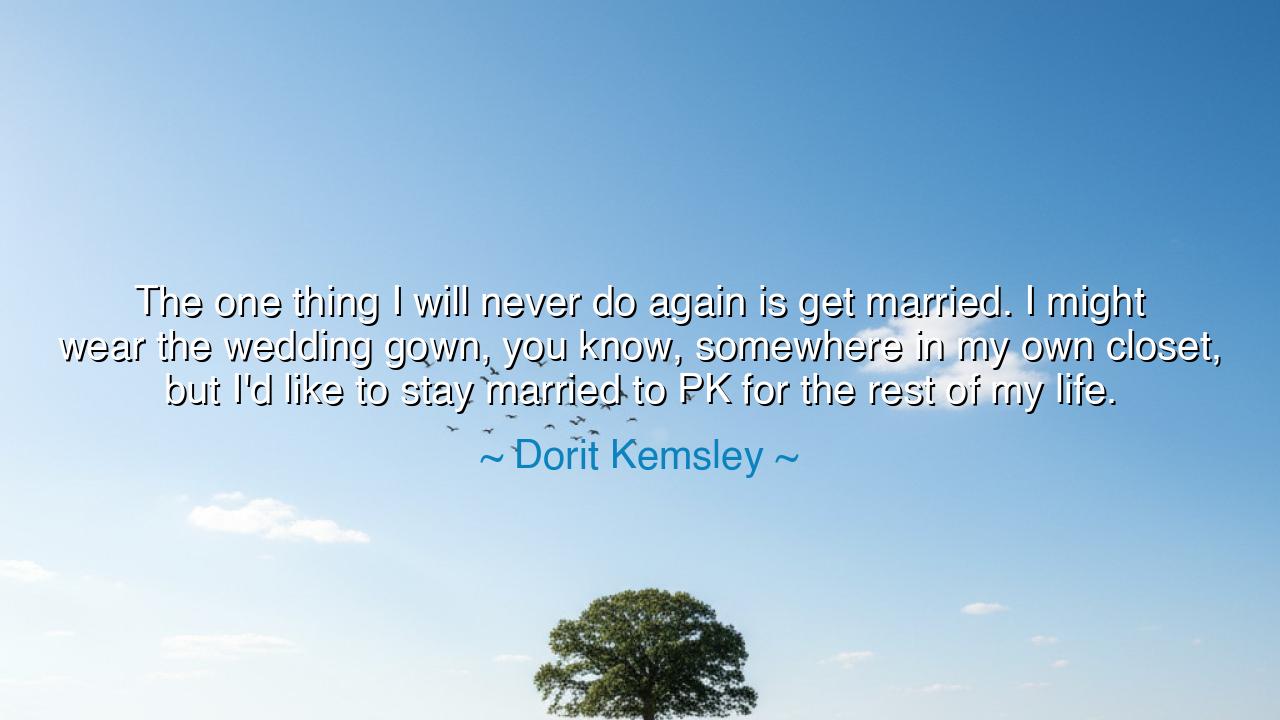
The one thing I will never do again is get married. I might wear
The one thing I will never do again is get married. I might wear the wedding gown, you know, somewhere in my own closet, but I'd like to stay married to PK for the rest of my life.






Hearken, O children of devotion and experience, to the words of Dorit Kemsley, who speaks with the wisdom wrought by both celebration and reflection. She declares that she shall never marry again, yet expresses a desire to honor the wedding gown, a relic of ritual and promise, kept within her own closet as a symbol of the sacred moment. Herein lies the eternal teaching: that ceremony is fleeting, but the bond of love and commitment is enduring, and that the heart may cherish memory without repeating form.
Kemsley’s words reveal the distinction between ritual and essence. The wedding is a brief performance, a declaration before the eyes of the world, but the true labor of life lies in the marriage itself—the ongoing cultivation of trust, intimacy, and fidelity. Across ages, from the stoic marriages of Roman matrons to the enduring partnerships of medieval queens, the lesson has persisted: the value of union is measured not in ceremony, but in the constancy of devotion and the care of daily life.
Consider the union of Queen Elizabeth II and Prince Philip, whose wedding was grand and widely celebrated, yet it was their decades of steadfast companionship, shared challenges, and mutual respect that became the true testament of their love. Kemsley mirrors this truth: the gown is but an ornament, while the bond with PK is the enduring treasure, the heartbeat of her life. The ephemeral pageantry pales in comparison to the labor of love, presence, and partnership.
There is also the lesson of personal boundaries and choice. To eschew marriage again does not signal rejection of love, but a recognition of the limitations of ceremony and the primacy of authentic connection. Kemsley honors her own path, choosing to preserve her devotion to her spouse rather than seeking repetition in ritual. This discernment is a hallmark of mature wisdom, recognizing that devotion need not be validated by repetition of formalities.
O seekers, understand this: the relics of wedding tradition may be cherished, yet they are not the source of lasting union. True marriage is sustained in the quiet acts of care, fidelity, and attention, rather than the fleeting applause of a day. Kemsley’s counsel reminds us to treasure what endures, and to regard ceremony as a symbol rather than a measure of love.
Thus, O children of reflection, carry this teaching within your hearts: honor the symbols of love—the gown, the vows, the celebrations—but invest your soul in the living union. For it is in the steadfastness of partnership, not the repetition of ceremony, that the eternal spirit of marriage finds its deepest and most abiding fulfillment.






XLxuyen ly
It’s beautiful that you want to stay married to PK for life without needing the traditional wedding again. This makes me wonder, do you think people place too much importance on the wedding day itself rather than the long-term commitment it represents? How do you think your perspective on this could help others view marriage differently?
TNPham Thi Nhung
I admire your honesty about the subject of marriage. It seems like you've found a way to stay connected with PK in a meaningful way without needing to do the traditional wedding again. What do you think the idea of marriage means for you personally—do you feel it’s more about the bond and less about the societal traditions that come with it?
DMTran Duc Minh
Your statement is really thought-provoking. It seems like you’ve embraced the commitment to PK without the need for another wedding, which can be seen as refreshing. Do you think that many people feel pressured into traditional wedding ceremonies because of societal expectations, or do you think it’s a personal decision to forgo that formality?
NKNguyen Nha Khanh
I totally get what you mean! Sometimes the idea of a wedding ceremony feels more like a societal expectation than a personal desire. It's refreshing to hear that you're focused on the lifelong commitment rather than the big event. How do you think your approach to marriage impacts the way others view relationships and commitment in general?
NTGiang Nguyen Truong
That’s an interesting perspective! It seems like you’ve found peace with the idea of marriage, but perhaps not the traditional aspects of it. Do you feel like the wedding ceremony itself is overrated, or do you just prefer to focus on the lifelong partnership rather than the event? I’d love to hear more about how you view marriage now versus before.